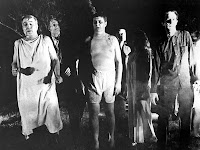I'd like to throw out some writing topics this month. I'll start with setting because that's sometimes what my stories start with (either setting or character).
Do you ever see a wonderful old building and think--that would make a great setting? Or drive through a sort of spooky town and wonder if you could put zombies--lovers--a murder--a shootout there?
What setting you use depends so much on what genre you're writing, and what mood you're creating. A quaint artist's colony would be a good setting for a cozy mystery centered on on antique shop or tea parlor, or maybe a light romance between two artists, say a basket weaver and a glass blower. A deserted mountain cabin would make a good hideout for a crazed bomber, or, if you brought on a snowstorm, some disparate people could be stuck and isolated there for a drama of conflicting passions and personalities. Gritty, big city streets are good for stalkers or sex crimes. Maybe a police procedural or tough-guy PI character.
Of course, zombies could roam the quaint artist's colony, too, and that would be using the setting as a contrast to the theme. And a cute romance could take place in a big city despite the gritty, dirty streets.
Are you drawn to books that use particular settings? Do you like exotic locales? Homey ones? If you see a book set in San Francisco, or Rome, do you automatically grab it? Does a real place fascinate you more than a made-up one--or another planet or dimension?
One thing to remember, no matter what you use for your setting, is that it's the backdrop for your story. Everything happens within the setting. The more you can tie the setting in to what's happening, the better. If the place sets the tone, or the mood, for the story, you're ahead when the reader starts the story.
To put the reader into the setting, you have to know it intimately, whether it's real or not. If you're using an existing place you've never been, you'll have to find out about it. If you know the temperature and humidity, you'll know how the air feels, and you can then let the reader know. And you'll know what your characters should be wearing--whether they'll be sweating or having goosebumps. It's not that hard to research a new setting using the internet. You can find out when the sun rises and sets with a little searching, so you'll know when to make it get dark and light.
As a reader, I appreciate it when I know where I am right off the bat. That's not to say I like a big blocky paragraph telling me where I am with a flat, lifeless description. Much better to work it into the story--but do it soon so the reader can orient himself and know what to expect. If you're on a seashore, a mention of sand and waves will do it. Beeping horns and traffic lights will set the reader into a city.
It's easy to tell the reader what the characters are seeing of the setting. Go the extra step and tell the reader what there is to hear. If you can work in a smell (salt tang at the beach, exhaust fumes in the city) or even a taste (that's a hard one sometimes) the reader will be more "there". Lastly, if you character can touch something, and communicate the texture, the reader will have all five senses engaged. I think this is important for the first scene, or for an important one. Every scene can't include taste and touch, of course, or even smell, but it's good if some can.
Does anyone want to add some words on settings? I'm sure I haven't covered everything!
All photos are in the public domain and from Wikimedia Commons.






Incorporating setting into the story is still something I'm working on, because my early drafts have too much dialogue and not enough description. But most of my stories are set in Chicago, because that's where I've lived for the past several years.
ReplyDeleteI've read books where setting was integral to the story, and other books where I wasn't even sure what city they were set in. I think it depends on how writers use the setting, because I read somewhere that sometimes it can be a motif or even a character in itself.
Chicago, where I also lived for awhile, can give a story some great, distinctive atmosphere. I didn't mention much about weather above, but a Chicago setting, I think, would have to include some weather. Hottern hell in the summer, coldern hell in the winter. And if you're anywhere near the lake, a wind that goes to the bone.
ReplyDeleteI agree, some stories don't need to be set anywhere specifically, but even in those cases, I'd like to know where I am at the beginning of a scene. Indoors, outdoors? At an airport--a big one, a tiny one? Etc.
Thanks for posting!
Excellent points, both of you!
ReplyDelete